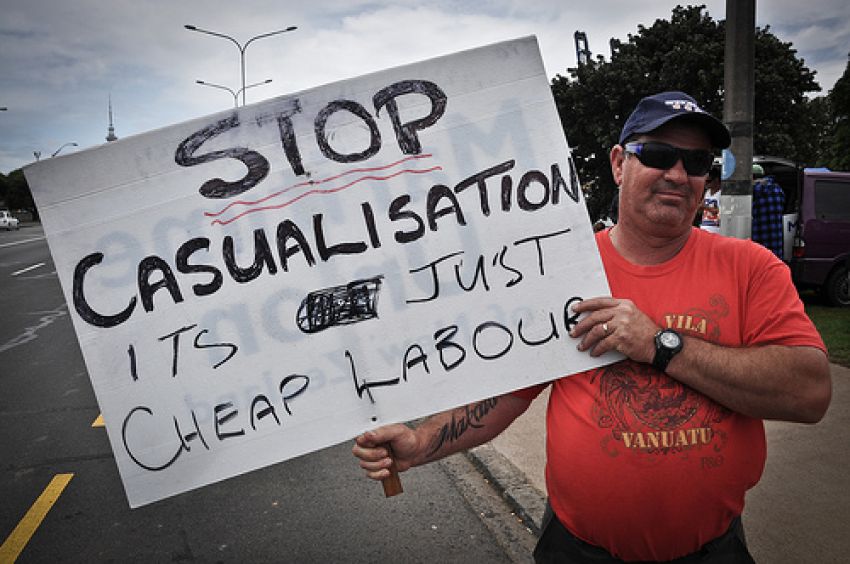
Like many single parents, Helen Said and Ewen Kloas have spent years fighting their way out of the casual labour poverty trap to rebuild their lives and provide for their families.
Kloas, a casual building worker, and Said, a contract teacher’s aide, both made submissions to the Australian Council of Trade Unions’ recent Inquiry into Insecure Work.
Kloas told the inquiry: “I have worked in the construction industry for over 33 years now and have seen how the industry has gone from secure work to insecure work.”
He said that today, regardless of whether construction workers are classified as full-time, casual or sub-contractors, “once the job has been completed the employer can terminate your position at will”.
Said said the switch from permanent full-time to part-time contract work was sparked by her child care difficulties while working shifts as a Tramways Depot Trainer: “I was forced to accept a transfer to a less secure position in an office, which offered no shift/penalty payments and ultimately was pressured out of my job in the wake of privatisation …
“I am now earning less money than I earned in that office in 1995, I am on insecure contract work so that I can have school holidays/evenings off with my children and yet I now have much higher bills to pay.”
Kloas likened working for labour hire companies to “taking part in lotteries, you never know if you’re going to land a day's work, two weeks' work or six months' work and the gaps between employment can be anything from one day to two weeks or more”.
To get by, Kloas has enrolled with several labour-hire companies that offer work under the Construction Forestry Mining Energy Union enterprise bargaining agreement. But many companies try to employ building workers under inferior workplace agreements.
He told the inquiry that this “adds another aspect of competition to the hiring environment, not only do workers have to compete for jobs with their skills but we are also in competition with our wages …
“One labour hire company will win a contract to supply workers to a particular company over another because they can charge less by paying an inferior wage.”
Video: Secure Jobs. Better Future Launch Video. yrawma.
Casual workers with young children can find themselves working for little or no real economic benefit, as Said found out when she separated five years ago.
She said: “I took on subcontract cleaning to help make ends meet and keep Centrelink off my back. It fitted in with school hours but, during term holidays, this involved driving from Preston to Thornbury or Reservoir for childcare, then to Collingwood or Fairfield for two to three hours' work, then driving back to pick up my bewildered whinging kid who begged me for no more of this.
“Car expenses were tax deductible (if in fact I actually earned enough to pay tax), but childcare still cost $10 and I lost some Newstart payments for my trouble.”
Said also told the inquiry: “After school care often has to be booked in advance as this is a profit-making service. How can you book in advance when you don’t know your hours of work? Under Centrelink rules, [mothers have] the right to refuse work because of lack of child care, but refusing work makes her poorer and puts her lower down the list of people the employer calls when work is available …
“There is no after school care for secondary school students, some as young as 11, whose mothers are being forced to return to work. Although employers often advertise their part time casual work as being ‘flexible’, what they really mean is that you have to be flexible to fit in with them …
“On contracts I often do not earn holiday pay and cannot afford to take my children on holidays. They are missing out on seeing Australia and doing things I did as a child.”
After seven years of casual building work, Kloas said he feels “the conditioning of instability has become a part of me …
“When the work is thin, sitting at home waiting for the phone to ring and ringing in to the various labour hire companies has its toll on my mental wellbeing …
“As for a house loan, forget it. The one and only time I went for a house loan three years ago no bank would touch me. After talking to a mortgage broker I was advised to look at other investments, unless I got a full-time job for at least a year, or got married with two incomes coming in otherwise the risk is too great.”
[To read more submissions from the inquiry visit securejobs.org.]